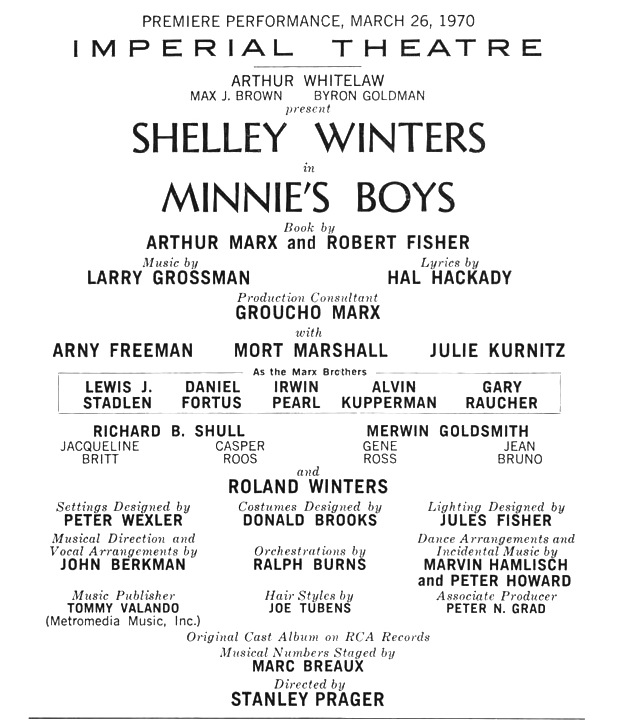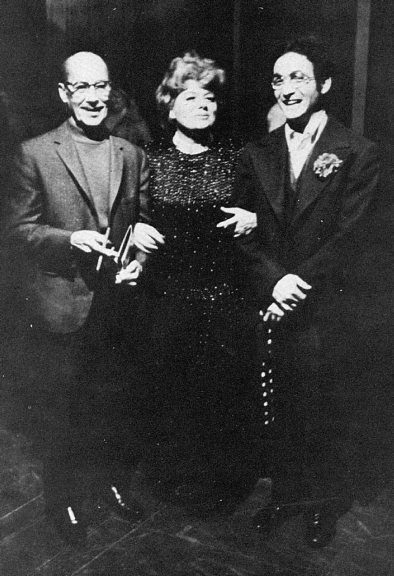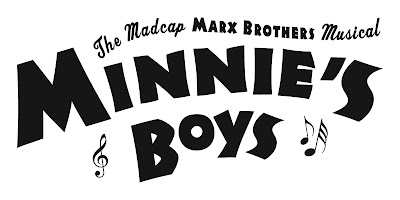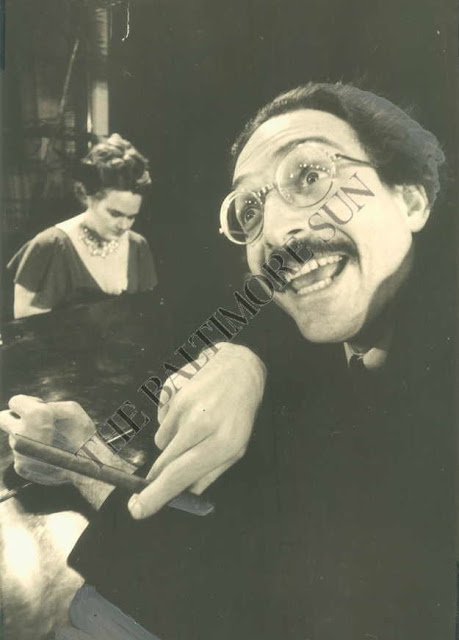 |
| Playbill for Minnie's Boys "A Rollicking New Marx Brothers Musical" |
"Minnie's Boys", the legendary Broadway musical Flop about the early days of the Marx brothers and their mother/manager Minnie, (producer Sol Siegel's planned film biography of the Marx bros, also called "Minnie's boys" had been in the works several years earlier but never got beyond a script) the driving force behind their success, was first conceived by Groucho's son, writer Arthur Marx who proposed the idea to producer Arthur Whitelaw (or as S.J. Perleman referred to him in a letter to his friend Al Hirschfeld "Outlaw") in 1969.
 |
| Minnie Marx 1865-1929 http://en.wikipedia.org/wiki/Minnie_Marx |
Whitelaw was friends with Groucho Marx, so the producer signed the 79 year old comedian on as the "production consultant", most likely to appease him and to avoid any possible Marx family lawsuits. From his home in Los Angeles, Groucho was consulted on many decisions to do with the early stages of the show, including choosing the books author and the pivotal role of the actress who would portray his mother.
 |
| Shelley Winters as Minnie Marx with fellow cast members portraying the four young Marx brothers (brother Gummo had retired from the act at this point) |
 |
| David Steinberg and Groucho Marx, 1970 |
 |
| Earl Wilson on Hippie David Steinberg being picked to write the Marx bros play |
Arthur Marx was hired to write the show's book along with his "The Impossible Years" collaborator Robert Fisher.
 |
| Arthur Marx, son of Groucho, grandson of Minnie http://en.wikipedia.org/wiki/Arthur_Marx |
 |
| Groucho Marx, circa 1970 |
 |
| Producer Arthur Whitelaw and his star, Shelley Winters |
 |
| Totie Fields: "Too Jewish" Shelley Winters. Groucho admired her "big knockers"
For some reason (perhaps to keep costs down?) rather than hiring established Broadway songwriters of the time such as Stephen Sondheim, Julie Stein, Jerry Herman, John Kander & Fred Ebb or Lee Adams & Charles Strauss, Whitelaw hired two Broadway novices, Hal Hackady to write the lyrics and Larry Grossman to write the music
http://en.wikipedia.org/wiki/Hal_Hackady http://en.wikipedia.org/wiki/Larry_Grossman_(composer) |
It wasn't long after the previews began that word began to leak out that there were severe problems with the show, audience members were walking out and the laughs just weren't coming where they should. Veteran comedy writers were invited to assess the show and offer suggestions, to "punch things up", among them, veteran Marx brothers writer and longtime Groucho friend S.J.Perelman (who described what he saw to his friend Al Hirschfeld: "a scalding descent into a tub of such merde as hasn't been seen outside a Catskill summer camp show" and declined the offer to help),
 |
| Groucho and S. J. Perelman |
One witness pinpointed what was perhaps the main problem: "whenever Minnie's Boys got funny, their mom (in the shape of Shelley Winters) would come in and Gummo up the works".
 |
| The poster for the show, artist unknown (to me) |
It was at one of these previews in early 1970 that my family and I went to see the show and I ... loved it! Of course, being 11 years old, I tended to love every show I was taken to see, especially the big Broadway musicals. But I was already a huge Marx brothers fan so getting to witness the young Marx boys slowly evolve into the characters of the Marx brothers was thrilling for me, and if the music was unmemorable, and Shelley Winters shrill and unable to actually sing the songs (she "yelled" them), it didn't bother me. To me, I was witnessing the Marx brothers live in full color on stage!
 |
| the (actual) Marx brothers |
Lewis J. Stadlen as Groucho in a mid-seventies Aqua-Vela commericial (featuring Groucho Marx's then girlfriend Erin Fleming):
http://www.youtube.com/watch?v=5-aKv8wsnOg
 |
| Shelley Winters and Groucho Marx in New York during the previews... |
When word reached Groucho that the show was in serious trouble during the early previews, he flew into New York on new years day 1970 for an extended stay at the Regency hotel in a halfhearted attempt to live up to his "production consultant" credit. Aside from appearing with the five young actors dressed as the Marx brothers on the Dick Cavett show, this would consist mainly of backstage reminiscing to the mesmerized cast and crew about the Marx brother's early vaudeville days and distracting everyone from rehearsing.
Arthur Whitelaw solved this problem by hiring a young, sexy personal secretary for Groucho, to keep him distracted by walking and dining with him throughout Times Square. Groucho would eventually even propose marriage to her (his marriage to his third wife Eden had just ended). Still, he was in attendance nightly at the Imperial Theatre during the previews, including the evening I would see the show.
 |
| My Minnie's Boys playbill, autographed by Groucho |
I was in heaven and little did I suspect that this would be the first of three times I would make his acquaintance. It was an amazing evening for me, aside from loving the show, also getting to encounter a living comedy legend, the one, the only... Groucho
 |
| From the playbill, the cast and crew Color photos of the original production of Minnie's Boys: |
Only Lewis J. Stadlen as Groucho was singled out for unanimous praise.
As far as a show becoming an instant hit or flop, the only review that really mattered was Clive Barnes in the NY Times. Sure enough he loathed the show more than any other critic and brutally savaged it; "The idea of a musical on the Marx brothers before they really became the Marx brothers is splendid. What ever happened to it?" He went on to site every imaginable reason for it's awfulness, including the low blow that the score by Grossman & Hackady was "Gross and Hack" and perhaps that, as good as Stadlen was, he might be a one trick pony and only be able to do a good Groucho imitation (speculation is that the Barnes review is the reason why Stadlen was not even nominated for a Tony award, such was the power of the Times. Stadlen would indeed go on to enjoy a long, celebrated career in musical comedies and be nominated for 3 Tonys), Barnes finally adding: "You would be better at home watching the old movies".
 |
| The NY Times Clive Barnes, not amused |
 |
| Minnie's Boys newspaper clippings and reviews |
On a more positive note, flawed as it is, the show has been revived many times over the years, at colleges and regional theatres, including one touring 1972 production starring Kaye Ballard as Minnie, and another with Martha Raye and... the Hudson brothers (?!) which closed before it's announced opening. The show continues to find new audiences who enjoy the opportunity of seeing the Marx brothers once again come to life on stage.
 |
| Groucho, Shelley Winters, Lewis J. Stadlen pose after a preview performance (photo from "The Groucho Phile") |
 |
| Lewis J. Stadlen recreating a Marx brothers vaudeville sketch, mincing as a young Groucho |
 |
| Groucho telling Stadlen and the audience that he was "better than I was--and younger" (photo from "The Groucho Phile") a second Playbill cover... |
 |
| and a third |
 |
| "Be Happy" Minnie's Boy's sheet music |
 |
| Minnie's Boys original cast album |
The song that came closest to capturing the spirit of the Marx's and Groucho though was "You Remind Me of You", sung by Lewis J. Stadlen to the Margaret Dumont-like character in the show:
"You remind me of you, cold sober or blind, up front or behind, you'll always remind... me of you"
I believe the main problem Larry Grossman and Hal Hackady faced was trying to erase the memory of so many brilliant and funny songs written by some of the top Broadway & Hollywood song writers of the day specifically for the Marx brothers and Groucho, among them "Hooray for Captain Spaulding", "Hello, I Must Be Going", "I'm Against It", "Ev'ryone Says "I Love You", "Lydia the Tattooed Lady", etc, etc., (none of which were used in Minnie's Boys) a nearly impossible task.
http://www.amazon.com/MINNIES-BOYS-ORIGINAL-CAST-VINYL/dp/B0014HMTV6





























